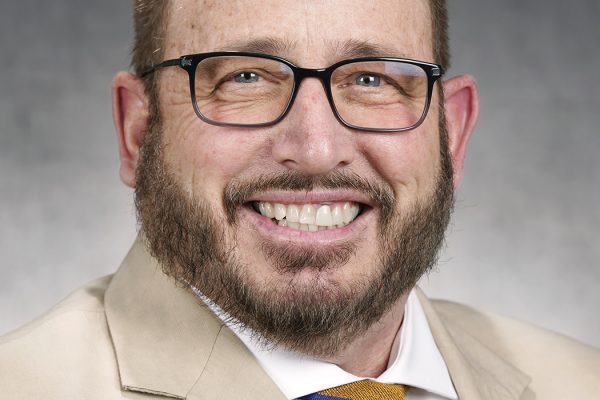Jen Schultz, DFL Candidate for Minnesota’s 8th Congressional District talks northern Minnesota issues
WTIP: Jen Schultz is the DFL endorsed candidate running for Minnesota’s 8th Congressional District against Republican incumbent Pete Stauber. Thank you very much, Jen for speaking with WTIP today.
Jen Schultz: Yeah, I appreciate being with you today.
WTIP: Jen, you are running for Minnesota’s 8th Congressional District against Republican incumbent Pete Stauber. Congressman Pete Stauber has served two terms in Congress. Jen, can you explain why you decided to run for the seat?
Jen Schultz: Well, I was a state legislator for eight years, and that was my first elected position, and it was very rewarding. I was, you know, my day job, I’m a teacher. I teach economics, and I’ve been working on health policy and health care reform for 20 years. I was excited to do that work in the state legislature, and was very successful at getting a lot of stuff done working across the aisle, people from all parties really enjoyed my work, navigated through the pandemic and then decided to retire in 2022 and no one was challenging Pete Stauber. So I jumped into the race really late in 2022 built a strong base of volunteers, had a very small campaign team. Only had a few months to run, but we did really well, so I decided to take another stab at the race this time, and now I have a bigger campaign team, longer run runway, to build even bigger base of supporters and volunteers and raise money, which, of course, you need and there’s a lot of excitement. Pete Stauber hasn’t accomplished anything in Congress. Unfortunately, we were optimistic when he first ran, but he’s only passed two bills. He’s been in office for almost six years. He’s named a Post Office and he created a task force, and then he’s taken some really terrible votes. He voted no on all of the big investment bills, like the bipartisan infrastructure bill that is funding not just the Blatnik Bridge, but our roads, our other bridges, and things like lead line replacement, broadband, which is desperately needed in all parts of the district, airport funding. So there’s a lot, there’s a lot of good stuff in that bill. I’m glad it passed, because we’re benefiting from it and in Northeast Minnesota, putting a lot of people back to work. And then he also takes credit for these projects that are being funded through this bill. So he’s really misrepresenting his votes. And if a few Republicans went to voted for that infrastructure bill, we would be out on all these projects, they wouldn’t be funded. So his vote does matter, and people are really frustrated that he takes credit for things he hasn’t really supported in Congress, but he votes also against things like the Pact Act, which covers health care services for veterans exposed to toxins and burn pits. He’s part of a Republican Study Committee that wants to really restrict Medicare and Social Security. I’m very concerned about that. A lot of people in this district depend on Social Security and Medicare. We want to strengthen those programs. So I’m running. You know, Congress has been very dysfunctional and chaotic the last few years. Republicans are in charge in the US House and stop versus part of that chaos and dysfunction. And people are tired of that. They’re tired of Republicans blaming and complaining. They just want their representative to get stuff done, work across the aisle, be responsive to their needs, show up and listen to their concerns, and Stauber has done none of that, and that’s part of the problem, and that’s a big reason why I’m running. I have experience getting stuff done, showing up in in these communities, listening to what their needs are, and solving problems, and that’s what I want to do when I’m elected in November.
WTIP: As you mentioned, you did run in 2022 against Pete Stauber, and jumped in a little late campaigning in 2022. Are the issues and topics similar to that of two years ago, when you were out campaigning and talking to your constituents? What you’re hearing from them, what they’re concerned about, and what they’re looking for?
Jen Schultz: Yeah, they are. I think it’s those bread and butter issues. You know, it’s health care access we have. People are very concerned about their rural hospitals and clinics and making sure they stay open. I hear a lot about funding ground ambulance from our communities and EMS. They need federal support as well affordable housing and child care, strengthening Medicare and Social Security. People, when they retire, want more certainty, and a lot of those just bread and butter issues. They want investments in broadband. They need cell phone service. They need these basic services. And then people are worried about the economy and inflation and wages. Up with inflation, so we need to make sure we’re bringing more opportunities and jobs that pay well with good benefits to the district. And that takes work, and you got to be, you know, as an elected official, you need a lot of energy, and I bring that too, and and I’m, when I’m in the room, I have thoughtful questions. I am a strong advocate for for my community when I was in the legislature. Want to do that for the entire Eighth District. So it’s those issues and others. You know, the district is the size of the state of West Virginia, but a lot of the common, lot of lot of the things I’ve mentioned are things that people throughout the district need, and we just need to bring back investment, just like when Jim Oberstar was our representative, he brought billions back to Minnesota. He knew how to work across the aisle and work with his colleagues, and that’s what we need more of. We need more folks that are moderate, common sense thinkers to go there and get these investments to address these these problems that people face every day. There we see so much political theater right now and grandstanding, and that’s we don’t we need less of that, and more people just getting down to the basics and and working to get things done, to really improve people’s lives, make them better. Shaba keeps talking about protecting our way of life, and what I have found is that people want a better way of life. They want a better future. They don’t want to go backwards. They want to go forward.
WTIP: How would you describe yourself being able to work across the aisle? How do you see yourself doing that, given the examples that you just touched on?
Jen Schultz: Yeah, so I served on, I came in the into the minority, so that my first term, I was in the minority, and the first bill I worked on was the Republican led bill on providing coverage for telehealth services, because I knew how that important that was for our rural communities to get access to health care and to make sure it was covered by their health insurance. So I was the only Republican advocating and cosponsoring that bill, and we got it done. And then I worked on other things. I was chair of Health and Human Services. Worked on affordable health care, expanding affordable coverage to more families. Worked on reducing drug prices. I served on the tax committee, so I wanted to make sure our tax system was more fair for everyone, especially low middle income folks. And I closed two corporate tax loopholes with my Republican colleagues, it was bipartisan. In fact, 80% of my bills had bipartisan support. And then in my last two terms, I worked with the Republican controlled Senate and the House. Democrats were in controlled the Senate, so still divided government, but was able to pass a lot of great bills with Republicans in the Senate, including bonding projects. I was successful in getting every, every capital investment project funded for my district. Really proud of that, and that included the money, the all cash funds for the new Essentia Hospital and St. Luke’s Medical District in Duluth. That was difficult because we didn’t have a bonding bill that year because we couldn’t get enough votes, but we had a really good tax bill, and I put that project in the tax bill, and that’s, you know, you can only get stuff done like that if your colleagues believe the projects are good, they know about it, and you can build that bipartisan support across not just in my own in the house, but in the Senate as well, And then to get the governor to support it. And during my time as a state legislator, I was also a Great Lakes Commissioner, and my job there was to protect and to promote the Great Lakes, and I was able to help advocate for federal funds to clean up the St. Louis River and to address things like invasive species and to look at all the emerging contaminants of concern in Lake Superior, because that is where a lot of us get our drinking water. So I’m really proud of my record. I got a lot done, and I think I’ll be able to do that very successfully in Congress. And I always tell folks, it matters who you elect. It matters who you send to Congress. They’re doing a lot of work, not just for the district, but for the entire state and country.
WTIP: Switching over to touch on the key issues, impacting some of your constituents here in the Northeast region of your district. Inflation is a big top of mind right now for many voters, as I’m sure across the entire state, affordable housing as well, and child care. Jen, can you touch on some examples of legislation or initiatives that you have supported in the past or are currently working on to address these?
Jen Schultz: Yeah, so you know what? What we have to make sure is that our economy is strong, and overall the state is doing really well. Financially. We’ve had surpluses, and we take the surplus and we reinvested back into the state, back into education and job opportunities and training and to address things like the workforce shortage, so we have to make sure that people’s wages, their benefits, can keep pace with the cost of living. And I think for a lot of folks, that’s that’s not happening, and part of that is corporate greed. We saw supply chain problems during the pandemic, and we saw corporations take advantage of that and increase prices, and those prices haven’t come down. So we have to look at, I believe, as an economist, a lot of the mergers and acquisitions and consolidation across the industry, and that includes the grocery industry that’s driving a lot of those price increases. We have to make corporations accountable and have more oversight of mergers, acquisitions and trusts. So we have to have antitrust and I’m very happy that the Biden administration, the Biden-Harris administration, strengthen the merger acquisition antitrust guidelines for the FTC and DOJ, and I think that’s going to be helping. But we see that across industries health care, there’s tremendous consolidation in health care, and that’s driving up health care prices. So we have to have more oversight, and that is a big role the government plays, and it’s a very important role. So hopefully that will help with inflation, but keeping wages strong, strengthening unions, making sure workers can collectively bargain and negotiate for their wages and their benefits is very important to me as well. I have 100% pro labor voting record according to the AFL-CIO in my eight year career as a legislature, I want to make sure we strengthen workers ability to negotiate what they need from their employer as well.
WTIP: Switching over a little bit to balancing jobs, a strong economy and environmental responsibility. What are your views on environmental protection, and how would you balance economic growth with that? As it relates to mining in Minnesota – there are a lot of discussions right now about copper nickel mining and protecting northern Minnesota’s watershed. What are your thoughts on that?
Jen Schultz: Well, first of all, I’m 100% pro mining and pro miner. Last cycle, we are endorsed by the United Steel Workers and the environmental groups. I don’t know of any candidate that’s been endorsed by both in the past. There’s a lot of work that needs to be done. This has been a very divisive issue, and it shouldn’t be. We have a lot of natural resources, and depending on the price of those minerals, it can generate a lot of revenue for the state and for these corporations and help put people to work. But what I’ve heard from everyone, and I’ve been doing a lot of work listening on this for many, many years, is that no one wants to pollute the water. Everyone wants to protect the water, because we all live here, and we drink the water, and we don’t want to do that also because of our property value, a lot of us only have our big asset is our property, our house, and we don’t want to destroy that property value by running the water supply. So we all have to come to the table, we need a strong leader to do that, to bring all stakeholders to the table, the tribes that litigate permitting and mining in the courts, they need to be at the table, the mining organizations, the residents, the environmental groups, they all have to be there to figure out, how are we going to do this in a responsible way, and that takes investment. And my opponent, Stauber, says he’s all pro mining. He’s worked this as his number one issue. He hasn’t done anything to move this issue forward, to make progress on mining, where the permits, the whole new permit process, needs to be reevaluated, but we need to do investments in research and development so we can figure out a way so we’re not polluting the water to address the sulfate runoff. And I’m confident that we can. We have the science it needs to be learned, that we need to know how to scale it up. We figured out how to take forever chemicals like PFAs out of the water, and actually very short amount of time, once we knew it was a problem, I think we can find the same technology to take sulfates out of the water and the other dangerous things that could get into the water supply. But like I said, takes a big lead. It’ll take the leader, and I’m happy to step up and do that. I’m all in on bringing everyone to the table, bringing back the millions of dollars will need to invest in the research and development to do it right. And I’m optimistic, because a lot of things are being discovered at places like NRRI, affiliated with the University of Minnesota, on the technology that they’ve that they need to scale up, and they need that investment to figure out how to do it.
WTIP: Jen, we’ve touched on a handful of things. Is there anything else that you would like to to say or share with the constituents of your district, particularly, maybe our WTIP listeners here as well?
Jen Schultz: I’m excited about this race. I’m very optimistic. It’s a brand new day now that we have a new top of the ticket. I’m excited about our Governor Tim Walz being selected as the vice presidential candidate on the Democratic ticket. I think that could be a really big deal for Northeast Minnesota. So I hope people will one vote in the primary on August 13 and then support me in the general election on November 5, and they can reach me by phone at 218-340-5686, or they can also visit our website, jenschultzforcongress.com to learn more about my positions on a lot of different topics.
WTIP: Thank you very much, Jen for for taking some time.
Jen Schultz: Thank you. Appreciate it.
Listen to the interview with Jen Schultz below.














